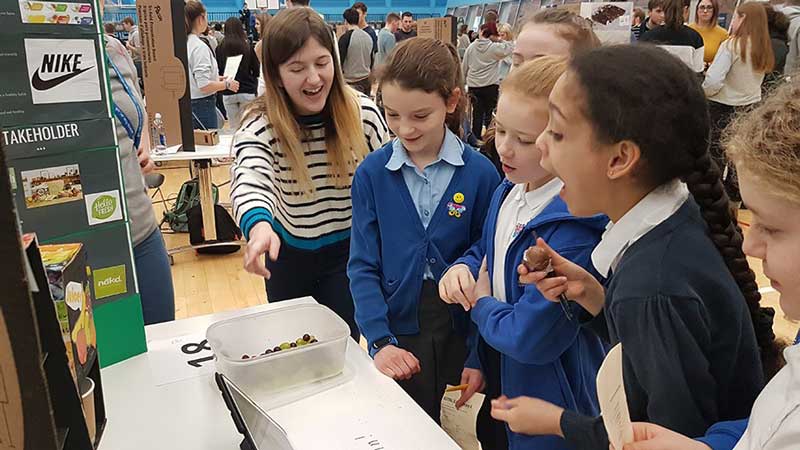Engineering the Future

Engineering the Future is one of Heriot-Watt's Flagship Schools activiities, bringing together undergraduates and school pupils to create innovative solutions to global challenges.
As part of the Energy, Geoscience, Infrastructure and Society (EGIS) undergraduate programme, 1st year undergraduates are set one week to come up with engineering solutions for global challenges. In 2019, the theme was healthy lives, and primary school children put their heads together and identified health-related problems in their homes and cities.
Mixed teams of engineers, biologists, planners, surveyors and geographers worked in 36 multidisciplinary groups to come up with solutions to the challenges set by Currie Primary School, Nether Currie Primary School, and Carrick Knowe Primary school pupils.
Challenges were varied and thought-provoking, ranging from mental health to fitness, healthy eating, recycling and pollution. The students rose to the challenge, and on Friday the groups presented their solutions and were judged by the primary pupils at an interactive fayre in Oriam. The visiting primary school children and their teachers were hugely enthusiastic about the project:
The opportunity you gave them enabled the children to use their creativity skills (a big initiative in Scottish Education at the moment). And, then seeing their ideas come to life was very exciting for them. In addition, the way the children were interacting with the students (adults in their eyes) was fantastic. I saw some of my children, who are usually really shy, chatting away to adults they don't know - it was great.
As well as the academic side of the learning experience, the students learnt how to communicate complex scenarios and solutions to different audiences, and how to engage the public in research in a meaningful way. And of course, there were winners – determined by both pupils and Heriot-Watt staff. The pupils winners, were team 16, who came up with energy generating paving as a fitness tool. The staff winners were team 5, who were challenged to come up with new materials for a healthy planet.
Colleagues from the Scottish Funding Council (SFC) were also there and were very impressed by the way the event connected primary and university students. SFC Assistant Director Helen Raftopoulos wrote about the visit on her SFC blog.
The Year of Health continued with a series of events and activities, spanning a breadth of highly topical interconnected activities including, for example; biological engineering, biophysics, computer science, mathematical biology, psychology, environmental health, cancer biology, neuroscience, rehabilitation technologies and the design of age-friendly cities and communities.
For more information see the Year of Health webpages and contact the HW Engage team on hwengage@hw.ac.uk.